At Vox, Brad Plumer interviews Duke biologist Stuart Pimm about his new paper on the acceleration of extinctions in the time of human beings. But he didn’t publish only about what will perish–he believes there’s also the option for us to avoid destroying diversity and perhaps our own species. An excerpt:
“Vox:
So extinction rates are higher now that humans are around. Why? What are we doing?
Stuart Pimm:
There are four big factors here. The first one, which is overwhelmingly important, is habitat destruction. We’re destroying the habitats where species are. About two-thirds of all species on land are in tropical rainforests — and we’re shrinking those rain forests.
In the Americas, the greatest numbers of species on the brink of extinction are in the coastal forests of Brazil and the northern Andes and Ecuador. If you look at the coastal forests of Brazil, east of Rio de Janeiro, something like 95 percent of all forest has been destroyed. So it’s not surprising that that part of the world has an unusual number of endangered species.
Second, we’re also warming the climate, and as it gets warmer species either have to move toward the poles or up mountains. This could be a big one in the future.
Third, we’ve been incredibly careless about moving species around the world. I’m in the Florida Everglades, where there are an obscene number of Burmese pythons slithering around, which can not do any good. So invasive species is a third.
Finally, particularly in the oceans, there’s just overharvesting. We’ve depleted the oceans by fishing and more fishing and yet more fishing, and driving species to the very brink of extinction.
Vox:
So the historical record shows that there have five mass extinction events in the Earth’s history. And lots of people keep suggesting we’re on the verge of a sixth. But what’s the criteria for this? How would we know?
Stuart Pimm:
I’m actually not a big fan of the term ‘sixth extinction.’ But we are certainly seeing a highly accelerated rate of extinction.
If that continues — and continues for many decades — then by the end of the century we are going to lose one-third or one-half of all species. And that kind of loss in biological diversity hasn’t been seen in 60 million years. The last time we lost that many species was when an asteroid plowed into the Yucatán in Mexico. So if trends continue, then yes, we are going to lose a large fraction of species.
But what the paper is about mostly, is ways in which we can avoid that. So yes it’s bad, but the paper is full of important news about how we can make a difference.”
Tags: Brad Plumer, Stuart Pimm

